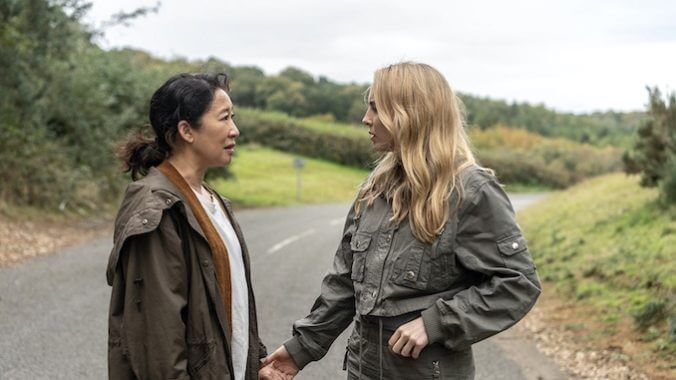It Still Stings: The Slow Decline of Killing Eve
Photo Courtesy of BBC America
Editor’s Note: TV moves on, but we haven’t. In our feature series It Still Stings, we relive emotional TV moments that we just can’t get over. You know the ones, where months, years, or even decades later, it still provokes a reaction? We’re here for you. We rant because we love. Or, once loved. And obviously, when discussing finales in particular, there will be spoilers:

It’s been over a year since Killing Eve ended, and I still find myself marveling occasionally at just how badly the show’s final season was handled.
Killing Eve was, at one point, an excellent show. Its first season introduced us to the bored and somewhat rebellious Eve (Sandra Oh), who finds her job unfulfilling, is often in trouble for overstepping the line, and jumps at the chance to work in a more hands-on role. As she begins to follow her intuition, tracking prolific assassin Villanelle (Jodie Comer), things escalate quickly into a cat-and-mouse game for the ages.
Rapidly attracting an audience thanks to its complex characters, strong dialogue, and compelling plot, the second season was equally as engaging. Mysteries deepened, brutal violence escalated, and Eve and Villanelle continued their will-they, won’t-they, Will-and-Hannibal-esque obsessive romance.
By Season 3, some critics wondered whether the tale was growing tired, but acknowledged that, although it may not have had the impact it once did, the eight episodes were reasonably good entertainment. Eve and Villanelle questioned the drive behind their relationship; we were given a few more breadcrumbs about the network of assassins that recruited Villanelle; established figures were killed off, with the show’s lack of sentimentality towards its characters perhaps becoming less shocking and more bleakly repetitive as time went on.
Killing Eve was renewed for a fourth season before the third season’s premiere even aired. The BBC was confident in audience loyalty, and despite a more tepid response to the third installment, hype around the final outing was high. This final season bore the weight of the promise of answers to all the questions that had accumulated over the show’s run. Who are the big-bad mysterious organization, The Twelve, and what do they want? Where do characters’ loyalties really lie? And, as many were most looking forward to finding out: would Eve and Villanelle find a way to be together? Season 4 took the bold choice to answer none of these questions, instead opting for a convoluted, unsatisfying, and ultimately infuriating ending that left viewers wondering where it all went wrong.
The first seven episodes of Season 4 feel like filler, yet once you reach the final showdown—what should be the climax of years of buildup—there’s nothing there. We never see who The Twelve are, and we never learn what they’re really about. We’re given a sketched-out backstory of its origins, with a needless twist revealing Fiona Shaw’s Carolyn Martens to have been implicated from the start.
-

-

-

-

-

-

-

-

-

-

-

-

-

-

-

-

-

-

-

-

-

-

-

-

-

-

-

-

-

-

-

-

-

-

-

-

-

-

-

-








































